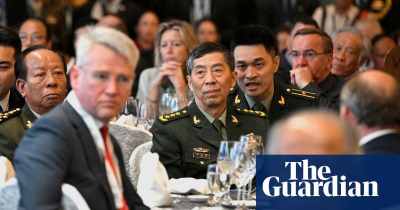The Guardian - China-Where is Li Shangfu Chinas missing defence minister highlights Xis total grip on power
September 19, 2023 4 min 744 words
中国国防部长李尚福已经三周未曾露面,这引发了广泛的关注和猜测。这一事件突显了习近平对权力的绝对掌控,以及对习近平判断的质疑变得日益危险的现实。尽管外界已有关于李尚福涉及军事装备采购腐败问题的报道,但中国政府一直未对其下落发表正式声明。这一事件也凸显了在习近平领导下的中国政治整肃浪潮中,高级官员的不确定命运。 习近平自2012年上台以来,将反腐败作为其标志性政策,并已在位长达十年之久,逐渐用自己的盟友和忠诚者取代了党内最高层的几乎所有人员。因此,如今被他打倒的任何人都将成为习的亲信。尽管有分析师质疑中国人民解放军高层存在腐败问题的可能性,但反腐败运动一直不仅仅是打击贪污,还包括党内的整顿,这意味着没有人能够幸免于此。 一些分析师认为,李尚福受到美国制裁可能有助于提升他的职业生涯,因为北京可以利用他的国防部长地位,要求解除对他的制裁,以便继续进行国防部长级别的对话。这也许解释了为何李尚福,一个背景是后勤而非作战的人,被任命为高级军事职位。 李的突然失踪也反映出在习近平执政下,高级任命受到的审查程序可能是不透明和有缺陷的。随着中国共产党从十年前的集体领导模式逐渐向习近平的集中统一领导模式转变,对习近平判断的质疑变得日益危险。 未来大家将密切关注即将于下个月举行的香山论坛,这是一次国防会议,中国国防部长通常会在会上发表讲话。如果李尚福不出现,北京可能不得不宣布一位新的国防部长上任,而这发生在新任外交部长上任不到两个月之后。这一事件引发了国际社会的广泛关注,也让人们对中国政治的内在动态产生了更多疑问。
Three weeks after he was last seen in public, there is still no official confirmation about what has happened to Gen Li Shangfu, China’s defence minister and the latest senior official to be seemingly swept up in China’s political purges.
Last week, Reuters reported that Li, along with eight other senior officials, was under investigation for the corrupt procurement of military equipment relating to his time at the helm of the equipment division of the Central Military Commission, the military’s ruling body, between September 2017 and October 2022. US intelligence has also made similar conclusions.
But Beijing has refused to comment on Li’s whereabouts. At a foreign ministry press conference on Monday, spokesperson Mao Ning declined to answer a question about Li, saying that it “was not a diplomacy question”. But multiple scheduled meetings between Li and foreign defence officials have already been cancelled, with the status of future meetings uncertain.
Li’s disappearance is particularly notable because he was only appointed in March. Like Qin Gang, the former foreign minister who was replaced in July, he has run into trouble less than one year after being boosted to the top ranks by Xi Jinping, China’s leader.
Xi, who took power in 2012, has made anti-corruption his signature policy. But he has now been in power long enough that he has replaced virtually all of the people at the highest level of the party with allies and loyalists, said Steve Tsang, the director of the SOAS China Institute. “So whoever he takes down now will be a Xi protege”.
Some analysts have questioned how corruption at the highest levels of the People’s Liberation Army – the armed wing of the Chinese Communist party (CCP) – could be possible more after more than a decade of Xi being the military chairman. But the anti-corruption campaign has always been about party rectification as much as graft-busting, said Tsang, meaning that no one is safe from its reach.
“High-level disappearances [are] bad for the party but they are not unexpected,” said Olivia Cheung, a research fellow at the SOAS China Institute. The party “constantly looks for and gets rid of the impure elements within itself, even if it is painful to do so … The underlying thinking is that short-term damage to the party’s image and elite cohesion is a cost to be paid in building a disciplined and effective party in the long term.”
In July, the military’s equipment department issued a rare public notice that it was investigating corruption relating to the bidding process, and the formation of private cliques, dating back to 2017. Last month two of China’s top Rocket Force generals in charge of the nuclear arsenal were replaced, in what was interpreted in an attempt to break patronage networks in the important PLA division.
Li’s time as head of the military equipment division also resulted in sanctions from Washington, which accused him of involvement the purchase of weapons from Russia’s biggest arms exporter. Beijing strongly opposes the use of sanctions and those imposed on Li were cited as a reason for him snubbing his US counterpart Lloyd Austin in Singapore in June. Military dialogue between the US and China has largely been frozen since Nancy Pelosi, the then House speaker, visited Taiwan in August last year.
Some analysts think that Li being subject to US sanctions may have boosted his career, as Beijing could use his position as defence minister to call for sanctions to be lifted if Washington wanted to resume defence minister level dialogues.
That may explain why Li, whose background is in logistics rather than combat, was appointed to the senior military position. Li’s sudden disappearance also speaks to the opaque – and perhaps flawed – vetting process that senior appointments are subject to under Xi’s rule. As the CCP has moved away from the collective leadership of a decade ago to the centralised rule of Xi, questioning Xi’s judgment has become increasingly dangerous. “Once Xi Jinping has made his decision about somebody, the vetting process is required to be patriotic,” said Tsang.
All eyes will now be on the Xiangshan Forum, a defence meeting that is slated for next month. The Chinese defence minister would normally speak at the conference, which was last held in person in 2019. If Li fails to materialise, Beijing may be forced to announce a new defence minister less than two months after the new foreign minister took office.
Additional research by Tau Yang

